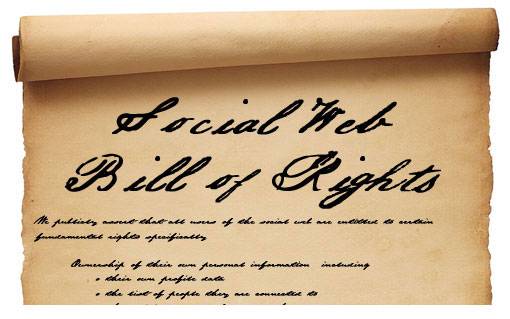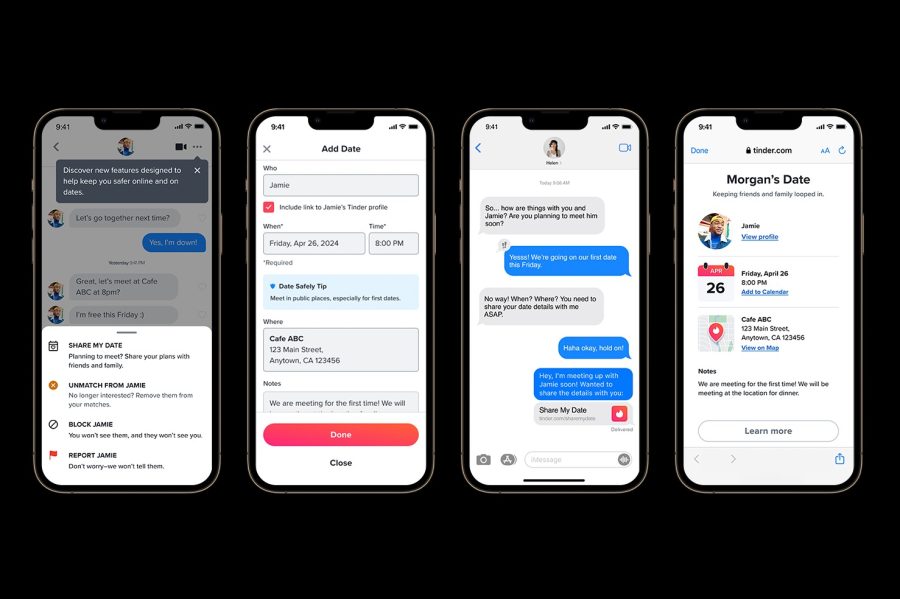As we enter the digestion phase of the current wave of tech innovation, an important part of the reflection process is to figure out what we, as users, feel are our rights in the new tech economy. We need to lay down the ground rules the define how we think we should should treated by technology creators. We’ve already seen this with blogging, one of the four major areas that contributed to the current web technology landscape as defined by Alex Iskold, with the creation of the Bloggers Code of Conduct.

Another main area of tech innovation has been social networks, according to Iskold. Social networks collect two types of data about us: personal information and attention information. These two streams of information tell a great deal about who we are, so thinking about how we want companies to handle this data is important.
With that in mind, four prominent bloggers and technology leaders, Joseph Smarr, Marc Canter, Robert Scoble, and Michael Arrington, on Tuesday drafted a “Bill of Rights for the Social Web.” The document outlines how companies should treat the data they collect from (and on) users of social web sites. To me, that should include personal data like your age, interests, location, and who you associate with, and attention data like the DVDs you’ve viewed, or the blog posts you’ve read.
Below is the entire text of the “Bill of Rights:”
We publicly assert that all users of the social web are entitled to certain fundamental rights, specifically:
Sites supporting these rights shall:
- Ownership of their own personal information, including:
- their own profile data
- the list of people they are connected to
- the activity stream of content they create;
- Control of whether and how such personal information is shared with others; and
- Freedom to grant persistent access to their personal information to trusted external sites.
- Allow their users to syndicate their own profile data, their friends list, and the data thatÄôs shared with them via the service, using a persistent URL or API token and open data formats;
- Allow their users to syndicate their own stream of activity outside the site;
- Allow their users to link from their profile pages to external identifiers in a public way; and
- Allow their users to discover who else they know is also on their site, using the same external identifiers made available for lookup within the service.
In their own words, this is “is not a document ‘carved in stone’ or written on paper. It is a blog post, and it intended to spur conversation and debate.” Indeed, as we further digest what this means to us as users of the social web, the draft bill can be refined and made more clear and precise. For now, it is a good start. Let’s break down the main points and try to clarify them a bit.
The main thrust of the document is that users should be able to assert three basic rights over their data:
- Ownership – Your personal and attention information belongs to you and not to the social site on which you create it. Alex Iskold remarked to me by email yesterday that ‘activity stream’ should be better defined, and I agree. For example, does that include attention data? It should.
- Control – You have the right to share, keep private, or completely revoke your data at your discretion. This is a possibly the most important part of the document, in my eyes, as it relates specifically to your privacy.
- Freedom – Because you own your data, you can do with it what you want, including taking it with you or opening it up to an outside service.

Conclusion
Despite some cynics calling this “verbal vaporware,” I think the discussion of user rights is a healthy one, even if a universally adopted bill of rights is a long shot. This basically boils down to ground rules for the control of a very valuable asset: information. Just like we expect certain levels of control and privacy over our personal lives in the offline world, we should expect the same level of control over our online lives. Why should the information we share with our friends on Facebook be any different than the information we share with our friends over dinner?
Hopefully the discussion will push social networks in the direction of creating more open systems that let users have better access and control over the information and attention data they create.
What’s your stand on the “Bill of Rights for the Social Web?” Is this an issue you are concerned about or do you think this is just a lot of wasted ink? Does the draft bill adequately cover the rights you’d like to assert? How might you change it? Leave your thoughts in the comments below.










